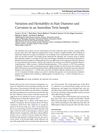 June 2024 in “Archives of Dermatological Research”
June 2024 in “Archives of Dermatological Research” SFRP2 and PTGDS may be key factors in female hair loss.
 June 2023 in “Research Square (Research Square)”
June 2023 in “Research Square (Research Square)” A higher genetic risk score increases the chance of getting benign prostatic hyperplasia and affects treatment outcomes in Han Chinese men.
 175 citations,
November 2009 in “PLOS ONE”
175 citations,
November 2009 in “PLOS ONE” Women look young for their age due to larger lips, less sun damage, and genes that prevent gray hair and wrinkles.
 139 citations,
December 2020 in “Cell Stem Cell”
139 citations,
December 2020 in “Cell Stem Cell” Male hormones affect COVID-19 severity and certain drugs targeting these hormones could help reduce the risk.
 43 citations,
April 2017 in “Experimental Dermatology”
43 citations,
April 2017 in “Experimental Dermatology” Female pattern hair loss has unclear causes, possibly involving genetics, hormones, and environment, and needs better treatments.
 42 citations,
January 2017 in “Genes”
42 citations,
January 2017 in “Genes” The gene KAP22-1 affects wool yield and fiber shape in sheep.
 40 citations,
January 2017 in “Intestinal Research”
40 citations,
January 2017 in “Intestinal Research” Genotyping for NUDT15 p.Arg139Cys can help predict thiopurine side effects in Japanese IBD patients.
 5 citations,
June 2016 in “Twin research and human genetics”
5 citations,
June 2016 in “Twin research and human genetics” Hair diameter and curvature are mostly determined by genetics.
2 citations,
July 2022 in “Journal of the Endocrine Society” Some women with PCOS have rare genetic variants linked to the condition.
 36 citations,
September 2015 in “Forensic Science International: Genetics”
36 citations,
September 2015 in “Forensic Science International: Genetics” Certain DNA variants can predict straight hair in Europeans but are not highly specific.
 3 citations,
January 2018 in “Postępy Dermatologii i Alergologii”
3 citations,
January 2018 in “Postępy Dermatologii i Alergologii” Longer TA repeats in the SRD5A2 gene may increase acne risk in Chinese people.
 1 citations,
May 2023 in “Journal of molecular evolution”
1 citations,
May 2023 in “Journal of molecular evolution” Pangolins have lost some skin-related genes, but kept others, leading to their unique scales and skin features.
 1 citations,
December 2022 in “bioRxiv (Cold Spring Harbor Laboratory)”
1 citations,
December 2022 in “bioRxiv (Cold Spring Harbor Laboratory)” Pangolins have lost some skin-related genes, but kept others, showing complex skin evolution.
75 citations,
October 2012 in “Journal of Investigative Dermatology” Alopecia areata can be triggered by specific immune cells without genetic or environmental factors.
 26 citations,
October 2013 in “British Journal of Dermatology”
26 citations,
October 2013 in “British Journal of Dermatology” Hair loss risk is influenced by multiple genes.
 20 citations,
June 2019 in “Experimental Dermatology”
20 citations,
June 2019 in “Experimental Dermatology” The research suggests that autophagy-related genes might play a role in causing alopecia areata.
 15 citations,
June 2011 in “British Journal of Dermatology”
15 citations,
June 2011 in “British Journal of Dermatology” No link found between aromatase gene and female hair loss.
 12 citations,
August 2019 in “BMC Medical Genetics”
12 citations,
August 2019 in “BMC Medical Genetics” Certain MC4R gene variants are linked to higher BMI in obese women with PCOS but do not cause PCOS.
 43 citations,
June 2018 in “Clinics in dermatology”
43 citations,
June 2018 in “Clinics in dermatology” People with atopic dermatitis are more likely to develop other skin conditions due to shared genetics and immune pathways.
 29 citations,
January 2021 in “Translational Psychiatry”
29 citations,
January 2021 in “Translational Psychiatry” The research suggests that Tourette syndrome is linked to both brain signaling and immune system pathways.
 25 citations,
July 2013 in “Journal of Dermatological Science”
25 citations,
July 2013 in “Journal of Dermatological Science” Six new hair loss factors in men not linked to female hair loss.
 6 citations,
May 2020 in “Scientific reports”
6 citations,
May 2020 in “Scientific reports” Researchers identified genes and proteins that may influence wool thickness in sheep.
 5 citations,
January 2016 in “Dermatology”
5 citations,
January 2016 in “Dermatology” No significant link between CAG repeat numbers and female pattern hair loss in Han Chinese population.
 4 citations,
November 2020 in “BMC Dermatology”
4 citations,
November 2020 in “BMC Dermatology” Researchers identified genes in scalp hair follicles that may affect hair traits and hair loss.
2 citations,
April 2022 in “Genes” The study found that the hair loss condition in Cesky Fousek dogs is influenced by multiple genes affecting skin and muscle structure, fat metabolism, and immunity.
 35 citations,
January 2014 in “BioMed Research International”
35 citations,
January 2014 in “BioMed Research International” Female pattern hair loss involves hormonal factors, genetics, and may be linked to low ferritin levels.
 16 citations,
September 2018 in “Clinical Biochemistry”
16 citations,
September 2018 in “Clinical Biochemistry” The document concludes that more research is needed to fully understand the causes of PCOS.
 6 citations,
June 2016 in “Experimental Dermatology”
6 citations,
June 2016 in “Experimental Dermatology” Frontal Fibrosing Alopecia is a poorly understood condition that is hard to treat and causes distressing hair loss.
 2 citations,
January 2017 in “Journal of Pigmentary Disorders”
2 citations,
January 2017 in “Journal of Pigmentary Disorders” Genetics, stress, and health issues can cause early hair greying, which affects self-esteem, and there's no cure, only hair dye.

Early-onset baldness is linked to genetics, lifestyle, and can indicate higher risk for heart and metabolic diseases, and affects mental health.



























